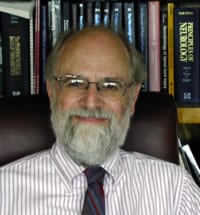
Professor, Neurology and Medical Genetics
University of Washington, Seattle
ASHG: If you could go back to when you were a trainee, what is one piece of advice you would give yourself for your current career?
Dr. Bird: When choosing projects to pursue, select those that you find really interesting and that match your particular talents. I initially tried to force myself to become a bench laboratory neurochemist and that did not really fit with my major interests or expertise. I was much happier and more productive doing clinical research.
This required a great many collaborations, which fortunately were readily available in my home institution (University of Washington), which was large enough to have a “critical mass” of outstanding investigators in numerous fields overlapping with my interests.
ASHG: What are your favorite and least favorite parts of your job?
Dr. Bird: I am a clinical physician at heart, so I greatly enjoy working with patients and families that have unusual and potentially important neurogenetic diseases. I like thinking about how these families may enlighten us about some basic biologic question, then gathering and assembling the data from these families and finding collaborators willing to pursue the questions at a more basic level. Interacting with the collaborators is part of the fun.
Now, late in my career, I especially enjoy helping young investigators start new projects and get publications and grant funding.
I enjoy writing papers but not grant applications. I am frustrated by “bean counters” and constantly filling out monthly, quarterly, and annual forms. IRBs have become too focused on small details and long forms and actually slow research. Dealing with security and encryption issues is also annoying.
ASHG: What do you think the future holds for the field of genetics?
Dr. Bird: The field is wide open. Genetics is now viewed as critical to every aspect of medicine and biomedical science. This is a good time to be involved in medical genetics. Cataloging and interpreting the immense volume of data will be difficult. Translating the information into clinically usable approaches will be complicated and time consuming.
The public is impatient and investigators should not promise too much too soon. The nature vs. nurture problem is very much alive in the public’s mind, making many people skeptical and suspicious of genetics. We constantly need to emphasize that it is not one or the other, but that genetics and the environment are both important and interact at many levels.
Nevertheless, the future is bright and exciting. I feel very fortunate to have been a small part of the “genetic revolution”.
Want more interviews? Join the ASHG Trainee Forum to keep up with new ones!
